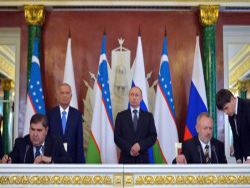
According to the credible website fergananews.com multi-year President of Uzbekistan Islam Karimov died August 29, at 79 years of life from cerebral hemorrhage. Official confirmation of death from the Uzbek authorities is not followed. But even authorities acknowledge the fact hemorrhage that for Uzbekistan, where the health of the leader has always remained a mystery, is very revealing.
The President’s daughter and Ambassador of Uzbekistan to UNESCO Lola Karimova said that her father’s fortune stable. “Stability,” however, is a vague concept and even if Karimov will survive, the question remains whether he will be able to continue to govern.
Coming from Tashkent through informal channels reports indicate an emergency situation. In particular, according to unconfirmed reports, the detained Deputy Prime Minister and Minister of Finance Rustam Azimov, considered as one of the most likely successors to Karimov. Asimov is responsible for foreign policy and in virtue of his office has the experience and skills of communication with foreign partners of Uzbekistan. He is considered one of the most “advanced”, although corrupt members of the government. If this information is confirmed, then they can be considered as evidence of a de facto takeover by competitors Azimov, Prime Minister Shavkat Mirzayev, with the support of the all-powerful head of national security Service (NSS) Rustom Inoyatova.
Mirzayev and Inoyatov, known as the hardliners. The consolidation of power in their hands, not only does not promise any liberalizing tendency, but also foretells an even greater tightening of the regime. However, the new head of state, not with authority, experience and charisma Karimov, will have to strengthen their positions to maneuver between the different clans and their business interests. In this regard, it will need serious external support, and such support is likely to come from Moscow. Russia traditionally considers Central Asia as a zone of its geopolitical interests, Karimov was quite obstinate leader who has led a very independent policy, maneuvering between the West, Russia and China. Uzbekistan, in particular, left the General Treaty on collective security (CSTO) and refuses to join the Moscow led Eurasian economic Union (EEU). In Moscow remember when Tashkent allowed to place in the us military base Uzbekistan, which Karimov was closed in 2005 because of the criticism by Washington of the bloody suppression of protests in Andijan.
The change of power in Tashkent opens opportunities for Russia to try to strengthen its influence in this largest Central Asian country. New leaders, since their own political ambitions and requirements may be open to such influence. But does not the fact that they hurry to return the country to CSTO and enter it in the EAEU. Tashkent would prefer to retain some freedom of maneuver, and Moscow will show tact and caution, trying not to alienate the problematic client with excessive pressure.
Strategically a much more important question, as the departure of the authoritarian leader will affect the internal stability of the country and the region. Uzbekistan is the Central state in the region that are in relationships of various degrees of conflicts with all its neighbors, especially Kyrgyzstan and Tajikistan. Additional difficulties for the proximity to Afghanistan and its permanent instability, terrorism and drug trafficking.
The country is also the Ferghana valley with its high level of unemployment and the spread of Islamic extremist groups. The valley was the scene of bloody clashes in the past. But the execution of law enforcement rally in the town of Andijan in 2005, which killed hundreds of people, still remains a festering wound on the body of society: there have been no objective investigation, no punishment.
Instead, authorities with a hot iron to burn off any expression of opposition. The democratic opposition crushed in the early 1990s. But most of all goes to the Islamists in their effort to preserve the secular foundations of the state authorities persecuted not only religious extremists, but religious citizens from wearing a beard or hijab. Such actions, combined with the lack of prospects of a decent, prosperous life, push many young people into the arms of the Islamist underground. There are no exact data about the number of Uzbeks who joined ISIS (banned in Russia organisation — approx. ed.) but at the beginning of 2016, the majority of experts agree on the figure of about 2 million people with a tendency to growth. In addition, Afghanistan is one of the most dangerous terrorist organizations in the world the Islamic movement of Uzbekistan (IMU), previously fought on the side of Taliban, now sworn allegiance to the “Caliph” of ISIS al-Baghdadi. To organize a full-scale invasion of Uzbekistan, or IMU ISIS at the moment is not a virtue, but the repression and corruption create a favorable environment for increasing the number of their supporters in the country.
The attitude of Islam is not the only dividing line in Uzbek society. Pursued by the Karimov regime’s policy of forced assimilation of the Tajik population, according to unofficial data, about half of the population of the country, and in cities such as Samarkand and Bukhara, the most is another time bomb that could explode in the case that the new government will find a mutually acceptable formula for inter-ethnic coexistence.
In the worst scenario, the destabilization of Uzbekistan will cause a chain reaction and will entail similar processes in Kazakhstan, Tajikistan and Kyrgyzstan. Particularly tragic are the implications of “contamination” of Kazakhstan: because there is the unresolved question about succession of power after the inevitable moving away from the scene many years President of the country Nursultan Nazarbayev. The lack of clear mechanisms of a transit authority as the background in the entire region of the chronic socio-economic problems, corruption, and clamping the freedoms increases the risk of instability and transformation of Central Asia into the next area of chaos and conflict.








